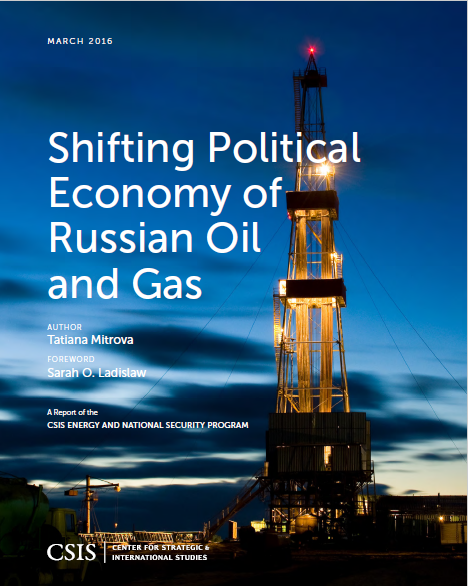Shifting Political Economy of Russian Oil and Gas

Dramatic changes in the Russian energy strategy and energy-based political alliances are to be expected due to the evolution of the domestic oil and gas market resulting from the economic crisis and sanctions linked to the annexation of Crimea.
Russia is one of the world's largest hydrocarbon resource holders, producers, and exporters, with nearly 6 percent of global proved oil reserves, 13 percent of the world's oil production, 12 percent of global oil exports, 17 percent of the global gas reserves, 19 percent of global gas production, and 24 percent of global cross-border gas trade in 2013. It is a dominant oil and gas supplier both for the European Union and the Commonwealth of Independent States, and holds great influence over both markets.
Russia is now going through an uncertain and difficult economic and energy transition. The economic slowdown, ongoing since 2012, was exacerbated in 2014 by dual external shocks from the sharp decline in oil prices and the imposition of financial and technology-oriented sanctions. Together with shifting markets for Russia's exports and its own domestic economic and political dynamics, these factors are spurring dramatic and impactful changes in the Russian domestic oil and gas strategy, as well as its view toward future energy markets and energy-based geopolitical alliances. These changes, while not yet complete or predetermined, will impact geopolitics, energy security, oil and gas revenue to the health of the Russian economy, and Russia's role as a hydrocarbon exporter and provider of oil and gas infrastructure, it is critical for analysts and policymakers to understand the evolution of Russia's oil and gas sector and its anticipated realignment.
This study is focused on how the Russian oil and gas sector is evolving and might continue to change under current circumstances. It includes a summary of the changes that have taken place to date, an examination of future potential changes under a range of oil price scenarios, and the potential means Russia might use to overcome those challenges.
This content is available on the CSIS' website: Shifting Political Economy of Russian Oil and Gas

Available in:
Regions and themes
Share
Related centers and programs
Discover our other research centers and programsFind out more
Discover all our analysesThe Caspian Sea as an Emerging Energy Hub : Potentials and Limitations
This report analyzes the prospects of the Caspian Sea region — and its key actors except for Russia and Iran — becoming an important energy hub serving the needs of the European Union (EU).
The European Union's Strategic Test in Georgia
The political crisis brewing in Georgia is of an existential nature for the country. What is at stake is Georgia's future as a democratic and sovereign European nation (EU).
Commanders of Putin's Long War: Purged, Reshuffled and Disgruntled
The trend of reshuffling the Russian top military command in the course of a fast-evolving and far from successful war has progressed unevenly both across the Armed Forces’ structures and in time. The rationale for and timing of the abrupt cadre decisions made by Commander-in-Chief Putin often defy logical explanation, and the rare official clarifications are no more informative than the usual information blackout.
Russian Military Manpower After Two and a Half Years of War in Ukraine
In addition to a military victory in Ukraine, the Russian leadership is planning to build up sizable troop formations for a possible conflict with NATO in the Baltic region and the Kola Peninsula. In particular, current plans aim for the military manpower to grow by about 350,000, reaching a total of 1.5 million soldiers and commanders. In the context of the current conflict in Ukraine, this cannot be accomplished without a new wave of mass mobilization.










